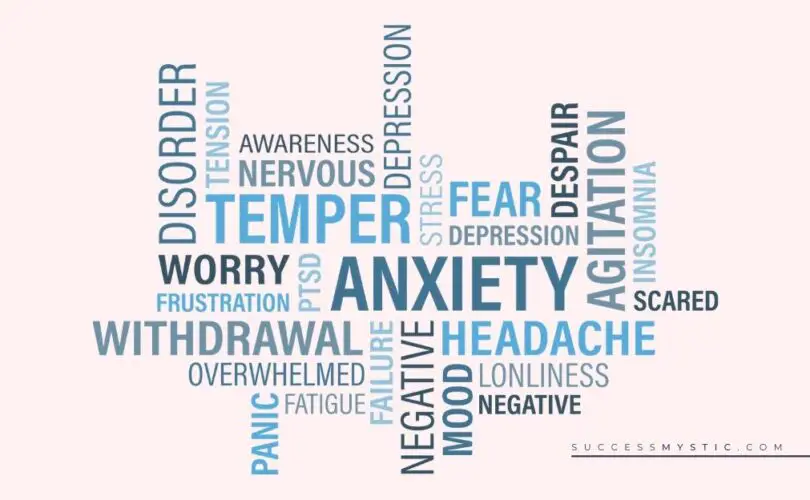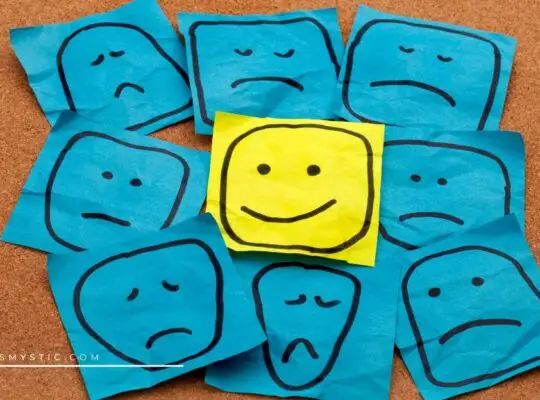Within the turmoil of daily life, meeting deadlines, fulfilling obligations, and trying to enjoy your life, it can be hard to find time to tackle and deal appropriately with the difficult emotions that arise from all of life’s many situations.
Difficult emotions are a much a part of life as positive feelings, and by learning to accept these emotions, express them productively, and handle them proactively, you can learn from your emotions and become a stronger, more balanced person.
The first part of this journey, though, is learning to accept rather than avoid your difficult emotions, to experience the negative feelings you have in ways that are beneficial to you long-term, and to focus your energy in ways that are productive and healthy, rather than pushing these feelings away.
Below, we’ll help you learn to identify your difficult feelings, to assess how well you are currently handling them when they arise, why avoidance is not an effective coping strategy, and how learning to be proactive can change the way you approach and handle your difficult emotions.
What Are Difficult Feelings?
Those feelings that are often the most difficult for us to grapple with are also those that raise the most intense emotions. The most common difficult feelings that you may struggle with include loneliness, anger, sadness, and pain, but all of these essentially stem from the same emotion, which is fear. Whether we are afraid of being alone, afraid of losing something or someone, or afraid of emptiness in our lives, fear is a powerful emotion and guides our hearts and minds in many instances.
While you may choose to look at these emotions as negative or difficult, you could instead choose to accept that these feelings are a part of life. They provide us with opportunities to learn more about ourselves, they teach us how to handle problems more effectively, and they can help us develop empathy for others, as well. Difficult emotions also teach us about the unresolved issues that may lay in our past or are a part of our present.
Listening to your difficult feelings and the emotions they trigger inside you can be an effective tool for recognizing when things are not working in your life. These emotions, while strong, can serve as a compass for pinpointing problems in your life that you should address. These strong feelings can even help you identify paths to solutions, in many cases, or even help you create new boundaries in your life that will safeguard against future turmoil.
Listening to your difficult feelings, instead of ignoring them, should be viewed as a healthy way to cope with them as well as learn the valuable lessons in life that help us grow as humans. Becoming attuned to your strong emotions, checking in regularly, and even talking with yourself and others about your difficult feelings, can become part of your path toward greater happiness and lifelong mental health. Your emotions give you important information about yourself and your life and learning to hear these messages is an important skill to learn and cultivate.
Instead of viewing your negative or strong emotions as enemies, you should instead embrace them as friends and helpful contributors to your life. When you embrace them, learn from them, and make them a part of your life, you learn to deal more effectively with them and to respond appropriately to them and to those who ignite strong emotions from you.
Assessing How You Deal With Difficult Feelings
There are many ways you can assess your own ability to deal with difficult feelings. Several reputable sources offer online questionnaires that, while lengthy, give you a good idea as to where your strengths and weaknesses lie when coping with difficult feelings.
Many of these self-assessment tools are meant to measure what is known as emotional intelligence, has gained popularity in the last decade. Also known as your emotional quotient, or EQ, emotional intelligence is another dimension of personality that focuses on your capacity to recognize not only your own emotions but also those of others, to correctly identify your own and other’s emotions, and to manage your reaction to yours and others’ emotions appropriately.
If you are interested in learning more about your own emotional intelligence in-depth, research the online tools that are available and select one that will work well for you. If you are just beginning your journey toward learning to deal with difficult feelings, start with a simple inventory instead.
Assessment
To gain a short but insightful look into your own emotional intelligence, consider the following questions. Answer each honestly about you right now, as you are today. Write your answers down, as this can be helpful later in guiding your work toward developing a higher sense of emotional intelligence.
- How often do you lose your temper when you feel frustrated?
- Do people tell you that you are a good listener?
- How capable do you feel in your ability to calm yourself down when you feel upset or anxious?
- Do you enjoy organizing groups? What do you enjoy most about this, if you do?
- Do you have difficulty moving on when you feel unhappy or frustrated?
- Do you have trouble focusing on something long term?
- Do you enjoy your work? What is enjoyable about it?
- How often do you avoid conflict? How confident are you in your skills of negotiation?
- List your strengths and weaknesses in all areas of your life.
- How often do you seek out feedback on your work or in other aspects of your life in order to improve yourself?
- How often do you practice active listening when people are speaking to you? What does active listening mean to you?
- What are your long-term goals, and how often do you assess your own progress toward these goals?
- Do you struggle to identify others’ emotions? What emotions are the most difficult for you to identify in other people?
- How well do you develop a rapport with others, and in what ways would you like to improve in this are?
From each of these questions, you can identify areas where you already feel comfortable as well as those where you have room to grow. Set a few, short-term goals for yourself in one or two areas, then work toward developing new skills to address these.
Once you feel you have made progress toward these goals, reevaluate and set new goals in different areas. This is a continual process that should never end if you truly want to learn to deal with difficult emotions in your life.
Pitfalls Of Avoiding Your Feelings
Whether you stuff your emotions down or choose not to deal with them in positive ways, avoiding your negative or strong feelings is never a healthy option in the long run. Unfortunately, our society bombards us with constant messages that tell us that we should always be happy, that negative emotions are a terrible thing, and that we should not tolerate challenges or trials in our lives.
The consequence of this way of thinking is that many turn to alcohol, drugs, overeating, gambling, or other numbing activities to dull your feelings and prevent you from actually experiencing these strong emotions.
While these activities may temporarily prevent you from experiencing guilt, sadness, pain, or other strong emotions, they do not help you deal with the emotions themselves, which can have serious consequences.
When you numb yourself from experiencing the hard emotions, you also prevent yourself from really experiencing the positive emotions, as well. By ignoring, numbing, or otherwise choosing to avoid your difficult emotions, you are also not learning anything from these experiences and what they can teach you about yourself.
Powerful emotions are the result of struggle, failure, and hard lessons, and choosing to ignore the lessons you can learn from these experiences will not serve you well in your future.
A Realistic View of Difficult Feelings
Emotional health and well-being are not about being happy all the time. It is, instead, about finding a balance to how you experience and cope with your emotions, how resilient you are to problems and difficulties, and how well you use the information you learn from the negative events in your life to inform your future decisions.
When you focus solely on being happy, this can lead to anxiety, loneliness, and other difficult feelings. When you focus, instead, on learning from your emotions to inform your future choices, you will be a happier, more balanced person.
Let’s take a look at anger for a moment, as this is a difficult feeling that most of us probably believe is an emotion that should be controlled and quashed whenever possible. Anger often invokes fear in people, as we tell ourselves that it can lead to feeling out of control, anxious, and full of rage.
That is a reactive approach to anger that does not help you deal with feeling angry. Instead, that stance encourages you to fear anger even more and try to stop these feelings when they start to develop.
Anger can serve a purpose. When you are angry, you are more likely to defend yourself when you feel threatened or when someone is encroaching on your rights or needs. When you learn to express your anger productively, it can help others understand your boundaries, can teach people when to compromise with you, and can serve as an effective signal for directing others to back off.
Anger generally comes from a place of optimism rather than feeling bleak about the world, as you become frustrated with how things are in the world. People who are angry are much more likely to become advocates for change, to take action to inspire change, and to create and support causes that focus on making a change in the world.
These are not bad things, and we should, therefore, embrace our anger in healthy and productive ways that help us channel these types of difficult feelings into action that is production rather than destructive.
When learning how to deal with difficult emotions, it is important to pay attention to not only the triggers for these strong feelings but also the emotional and physiological responses they invoke in ourselves.
Break A Destructive Cycle
While avoiding your strong emotions may allow you some peace for the short term, you will definitely pay the price for this strategy over the long haul. By choosing to avoid your pain or discomfort now, you end up masking or numbing your strong feelings over time, which leads to destructive and unhealthy behaviors you must continue to repeat if you want to continue to avoid your difficult feelings.
By avoiding these challenges that life hands to you, you are also inadvertently narrowing your future options, as you work hard to avoid any future pain or unpleasantness.
Avoidance can become a self-perpetuating cycle that keeps you from exploring new options, taking risks, or exploring new places because they may result in difficult feelings.
Avoidance will just lead to more avoidance, which narrows your path even further, leading to a life void of experiences and opportunities.
Learn To Accept Instead Of Deny
When you become constantly vigilant about negative emotions and work to avoid these, you engage in a futile effort that will ultimately lead to frustration and fear.
When you decide that a certain emotion should be avoided, you must then live on high alert at all times to avoid experiencing that feeling.
You then experience fear regarding the possibility of these strong feelings, which in itself because of a negative experience. You perpetuate this cycle with your avoidance.
When you avoid difficult feelings, you are denying the truth about your life, as well, which is never a healthy coping strategy. This is not helpful to finding solutions, nor does it allow you to take control of your life or learn from your experiences.
Learn To Move On Faster
Learning to cope with instead of avoiding your difficult feelings can help you move on more quickly from challenges and obstacles. Avoiding these strong feelings just draws out the misery even longer, creating feelings of anticipation that can actually be worse than the emotions you are trying to avoid in the first place.
Instead of spending time and energy building up the possible outcomes that could be difficult, learn to be proactive and tackle things before they become major problems.
This will require you to develop skills of acceptance as well as how to express your emotions in a healthy way. Learning how to be proactive in your approach to life’s challenges is one way to handles these difficult feelings and learn from these challenging situations.
Dealing With Difficult Feelings: Becoming Proactive Instead Of Reactive
When you spend your life reacting to the events that affect you, you take away your own power to control what is happening and how you react to those events. Being proactive, rather than reactive, means your attitude focuses on what you can do, rather than on reacting to things that are happening to you.
When you focus on being proactive in how you handle your difficult emotions, you pay attention to how you can take action in your life, rather than blaming others or trying to ignore the cause of your strong feelings.
This will help you develop the necessary skills to effectively handling your difficult feelings, rather than ignoring or numbing them, while also learning the valuable life lessons these situations can teach you. You can learn to be more proactive in your life, but it involves making a shift in your mindset about difficult feelings as well as practicing new life skills and making choices in difficult situations.
Below are some suggested strategies that, when practiced regularly, can help you become more proactive in your thinking and in the way you handle and learn from your difficult emotions. There are many ways to use each of these strategies, and not all may be appropriate for you and your situation. Select the one or ones that make the most sense for you and practice it regularly to help you develop the skills necessary for being proactive in your own life.
Stay Focused on Resolution
When you are experiencing difficult feelings about a situation, it is vital that you stay focused on possible solutions or resolutions rather than your feelings. Shift your mindset to focus on possible solutions rather than your feelings about those solutions, which can help you release some of the difficult feelings you have in a situation.
The emotions themselves can cloud your judgment, preventing you from thinking clearly, which can make your situation even harder to deal with.
Learn to focus on those things which you can actually control as well as what you are learning about yourself and others from the situation. This will help you face future obstacles as well as teach you important life skills about the role your emotions play in your decision-making and other skills.
Difficult emotions should be processed and handled, but in the midst of a problem is not the time. Practice being proactive by focusing on the solutions that you can control, and the emotions will likely resolve when the situation improves.
Rely on Yourself
Learning to rely on yourself, instead of others, to solve your problems and to handle your difficult feelings, is an important step in your personal development. Learning to be self-reliant means you learn to accept your emotions, deal with them appropriately, and apply the lessons learned in your life in ways that will benefit you in the future. No one else can do this for you, and the faster you learn and accept this, the better off you will be.
When life presents you with challenges, you must make the choice to tackle it yourself. While you may need assistance and support along the way, it is your own determination and effort that will get you where you want to be in the future. This mindset means that you not only take ownership of your own strengths and goals but also your problems and areas of weakness.
Remember That Emotions Are Impermanent
While it can be difficult to remember in the midst of a challenge, all of your difficult emotions will eventually fade, and this can help you when times are hard. Being proactive means, you accept those emotions when they arise, paying attention to them, but giving them the space, they need to disappear just as they appeared.
Ask yourself what you are feeling, what you need to move past your emotions, and what support you might need to weather this brief storm. This can help you feel more in control of yourself and the situation, giving you the focus and attention, you need to be more proactive about solutions and moving forward.
Focus On Being Realistic
When you take a proactive approach to dealing with your emotions, you set goals that are realistic and attainable for you, which gives you the ability to act instead of just dreaming about a better outcome.
Identify your ultimate goal for the situation, then set smaller, benchmarks that will help you attain this outcome. These realistic goals contribute to your overall progress toward your dream of a healthier, happier life, and they provide you with measurable outcomes that you can achieve over time.
Setting lofty or unattainable goals is just another way of avoiding your feelings. This can be harmful to your overall happiness in the long term, stalling your progress in many areas of your life.
Be Honest With Yourself and Others
When you want to be proactive about the challenges you may be facing, it is essential that you have a clear understanding of what is happening, how your emotions are contributing to the situation, and what you need to work on in order to experience a successful resolution. Be honest in your self-assessment of your strengths and weaknesses and use this as an opportunity to learn and grow.
If you are not honest with others or yourself about the cause of your difficult emotions, you will find it difficult to make progress toward a happier, healthier future.
Be An Active Participant
Whatever is happening in your life to cause your difficult feelings, you must be an active participant in finding resolution and moving forward.
You must accept the consequences for all your choices, and you must never assume that things will just work out by themselves.
Surround Yourself With The Right People
Make sure that the people in your life who are helping you to learn to accept and express your difficult feelings are also interested in those same goals. You are more likely to learn these new skills when you have others in your life who are also proficient at or learning these same life skills.
Negative people or those who are experts at avoiding their emotions will not make good role models or help you achieve your goals.
Watch Your Language
When working toward a more proactive mindset, it is important to also what the language you use to talk to yourself and others about your difficult emotions.
Your words say a lot about what you believe to be possible and changing how you talk about your feelings has the power to alter how you are actually feeling. Here are some examples.
- Instead of focusing on “Why can’t I….” do or have something, instead reframe the conversation to be about “How can I….” accomplish your goal.
- “I want to….” should be the focus on your goal setting and work, rather than worrying over what you “should” or “deserve” to have.
- When things are hard, and you keep reverting back to old behaviors, instead of focusing on why you can’t stop doing what you are doing, instead reframe your words to be about what you would rather be doing instead.
- Focus on how you can change the situation instead of just accepting that is how it is.
- Instead of making excuses for not having enough time or being too busy, focus on how you can make changes that will give you more time to do what is important to you.
- Reactive people focus on why others cannot change, whereas proactive people accept others for who they are and instead focus on meeting their own needs.
Final Thoughts
When you decide to accept your difficult emotions, as well as become more proactive in how you hand yourself when difficult emotions run high, you realize that accepting those strong feelings can teach you a great deal in life.
Accepting your emotions and learning to be proactive allows you to accept the truth of your situation as well as your own personal strengths and areas for growth. You have more energy to deal with your emotions in a healthy way, because you are not trying to avoid or push them away.
Acknowledging your emotions allows you to become familiar with what triggers them as well as how you react to yourself and others when experiencing difficulties. It also teaches you empathy toward others who also may be experiencing difficulties in their lives.
Acceptance allows you to work toward pursuing your goals and making progress toward a healthier version of yourself. Avoidance does not teach you new behaviors or help you set new goals. Learning to accept your emotions also means you see that they are often not as bad as you anticipated, and they will pass with time.
Becoming proactive in your life and especially when learning to deal with your difficult feelings means you are taking an essential step toward controlling your life and reaching your goals. You will have the confidence and skills you need to overcome any obstacle life sets before you, ensuring you are on a path toward success if all aspects of your life.







